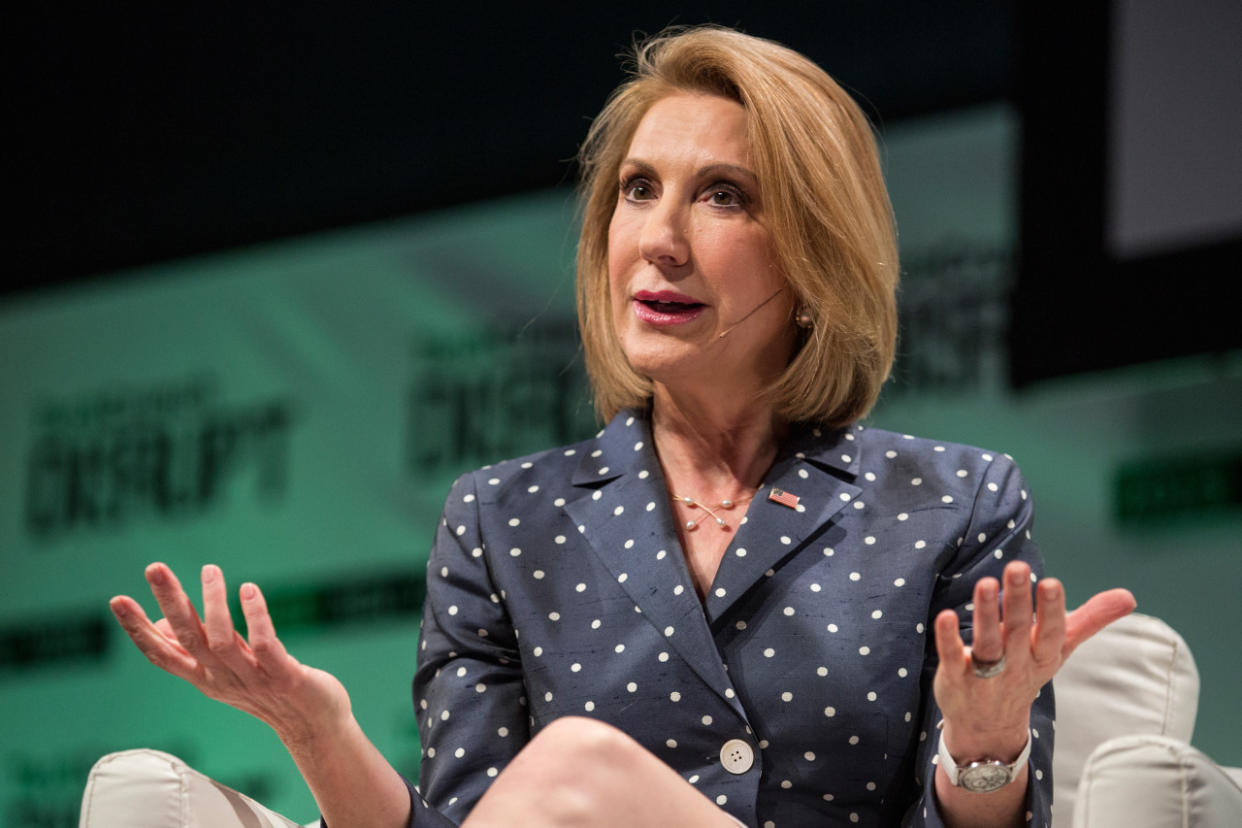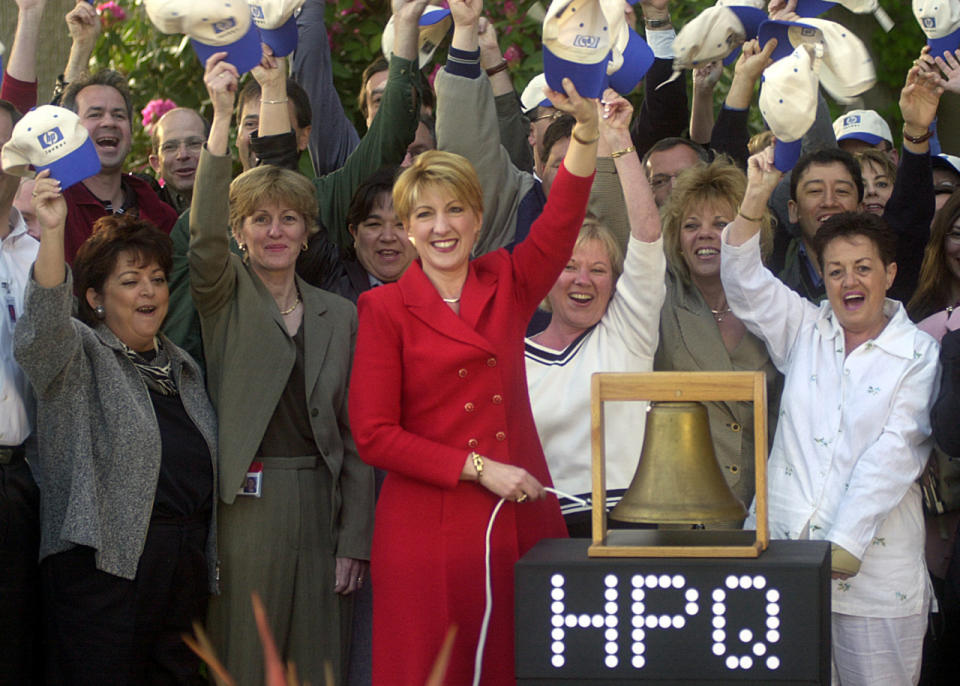So, what does Silicon Valley think about Carly Fiorina?

Republican presidential hopeful Carly Fiorina at TechCrunch’s Disrupt conference in May. (Photo: Andrew Burton/Getty Images).
The San Francisco Bay Area has long been home to legends of failure and redemption, a place where business leaders are often encouraged to flounder before they can truly lead a company to IPO Valhalla. No surprise, then, that former Hewlett-Packard CEO Carly Fiorina has taken to comparing herself to greats like Mike Bloomberg and Steve Jobs, both of whom stumbled in their fields before coming back as business-world icons.
Now Fiorina is attempting a similar turnaround in her campaign for the GOP presidential nomination, surging in national polls from the back of the pack to third place — right behind Ben Carson and Donald Trump — on the heels of her winning performance in Simi Valley’s GOP primary debate. But scrutiny of her tenure at Hewlett-Packard has soared along with support for her, and critics have come out of the woodwork to ding her Bush-era performance as a Silicon Valley executive and paint her as out of touch.
The Washington Post reminded us that her HP contract included a clause agreeing to ship her 52-foot yacht from the East Coast to San Francisco. Writing in the New York Times, Wall Street executive Steven Rattner asserted that her “lack of public service or sustained business success makes Mrs. Fiorina unqualified for the nation’s highest office.” In Politico, Yale management professor Jeffrey Sonnenfeld described her as “one of the worst technology CEOs in history.”
The Valley is also raising questions about the relevance of her résumé in today’s startup-centric technology world, even as it’s become clear that she has a unique opportunity to become its biggest advocate in the campaign.
According to Julie Samuels, executive director of the San Francisco-based policy and tech group Engine, local technologists are hungry for a politician who understands the inner workings of the tech industry and can offer smart solutions to net neutrality, patent reform, immigration for skilled workers and business regulation.
But Fiorina — along with the rest of the GOP field — so far has disappointed startup owners by failing to vigorously address these topics.
“We haven’t seen a candidate from either party really resonate yet with the startup community,” Samuels told Yahoo News. “No one has really come in with big ideas to fix these big problems.”
In what little Fiorina has said about these issues, her opinions have not always been celebrated in the Valley. In May, during an interview at TechCrunch Disrupt, she vowed that as president she would “roll back” the new rules on net neutrality, despite the fact that FCC chairman Tom Wheeler’s decision to block an Internet fast lane was widely popular within the tech community. In a 2014 piece in Forbes, she came out against patent reform, another issue for which many people in Silicon Valley are fighting. Fiorina has also taken a hardline stance on illegal immigration — without explaining how she would fix the complex visa application system that has kept tech companies from hiring much-needed high-skilled workers in the past.
Nor has she detailed plans on how to help a sector that entrepreneurs often complain is hindered by bureaucratic paperwork and unnecessary labor regulations.
As a result, many startup workers — who, according to Samuels, tend to have a libertarian mindset — have felt overlooked during the primary contest thus far. Garrett Johnson, a co-founder of the Republican policy and tech group Lincoln Labs, has hosted candidates like Fiorina, Rand Paul and Jeb Bush at events in the past, but says he still hasn’t heard many candidates speak directly to the problems affecting him and his fellow entrepreneurs.
“The last debate could’ve happened in the 1990s and no one would’ve known the difference,” Johnson told Yahoo News. “There was very little mention, if any, of the 21st century Internet economy.”
Without a comprehensive pitch for how to improve Silicon Valley, Fiorina’s tech experience has little relevance to workers who see her old firm as a relic of the past and revere the founders of today’s disruptive breakout companies, such as Evan Spiegel of Snapchat and Travis Kalanick of Uber.
“HP is an old, stale company,” Johnson said. “Silicon Valley is really focused on what’s hot and what’s next. I don’t think that she’s going to have a lot of street cred today because she was the CEO of HP in the late ’90s, early 2000s.”

Fiorina rang a bell to virtually open the New York Stock Exchange from HP’s headquarters in 2002. (Photo: Chris Preovolos/AP Photo).
Fiorina’s experience as a technology-world leader may be a distant memory for many of the Bay Area’s best and brightest, but advocacy groups nonetheless hold out hope that she’ll recognize that speaking about issues affecting the tech community could earn her a long-term advantage over her competitors.
“A politician would be very smart on the Republican side to talk about what they could do for startups and entrepreneurs,” said Rich Tafel, the founder of the public policy training group The Public Squared and the gay conservative group Log Cabin Republicans. “They’re sort of struck by her silence on it.”
Reached for comment, Fiorina’s deputy campaign manager Sarah Isgur Flores defended her candidate’s dedication to small businesses.
“Carly has a track record of challenging the status quo and will continue to be a vocal opponent of crony capitalism that crushes the entrepreneurs and small and community businesses that create two-thirds of the new jobs in this country,” she said.
Though Fiorina’s performances in the last two debates have showcased her skill at telling her story, making a case and selling it, her time at HP has left her with an unfavorable reputation in the Valley that she’ll need to overcome if she wants to become its standard-bearer, according to Vivek Wadhwa, co-author of the book “Innovating Women,” a collection of essays on women’s rising role in the tech industry.
“When I was interviewing women and researching who to feature in my book, I was surprised at the negativity that everyone expressed about her,” Wadhwa told Yahoo News.
Tafel credits that feedback to irritation that Fiorina has made herself out to be a business-world leader. Despite her comparisons, her professional path hasn’t been like that of local legend Jobs, as she was never asked to return to the helm of a company and hasn’t held a major role in the tech industry since 2005.
“She wasn’t a great business leader, and the fact that she’s running on that bothers them,” Tafel said. “It’s one thing to not do great in a tech company; it’s another thing to say that’s your bragging point.”
Thus far, Fiorina’s strategy for the primary race has been to appeal to a deeply conservative base, especially social conservatives, while emphasizing her list of accomplishments as a business leader.
But Silicon Valley’s tech employees remain hopeful that when the time comes for her to differentiate herself from the pack, she’ll apply her knowledge as a tech CEO to address real problems plaguing their community.
“If she fails to make that connection and tell that story, it’s a disservice to her campaign,” Johnson said.

